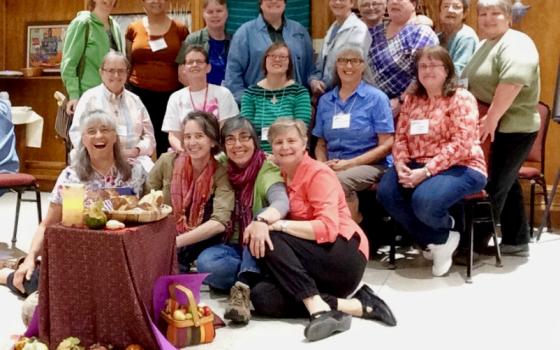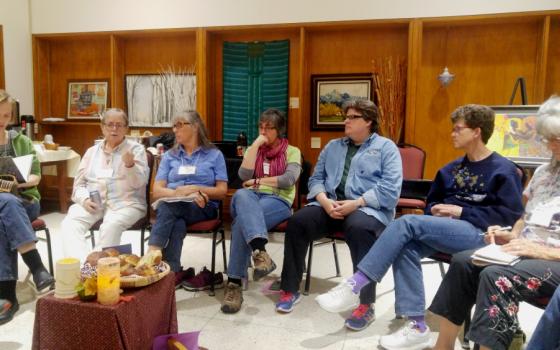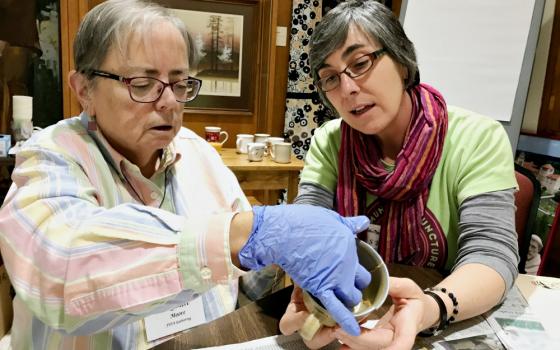"Bread is transformational food," explains master bread maker and theologian Peter Reinhart in a 2008 TED talk, "The art and craft of bread," a speech about the scientific process of bread-baking, from harvesting wheat to eating a loaf.
On a Friday night in October, I sat in a conference room with more than 15 other Franciscan Sisters of Perpetual Adoration (FSPA) and watched Reinhart's speech projected on a large screen. Captivated by the facts and the spiritual implications, I found that I couldn't stop nodding as I listened, as I made connections between bread-making and being part of a eucharistic community.
We were gathered at Assisi Heights, the motherhouse of the Rochester, Minnesota, Franciscans, for "PVII" weekend Oct. 20-22; "PVII" is short for "Post-Vatican II." This annual gathering is open to all Franciscan Sisters of Perpetual Adoration who joined the community since Vatican II, although most of the sisters who now participate tend to be those who have joined the community in the past few decades. The 2017 gathering centered on the theme "Blessed, broken and shared."
As Reinhart explained, the transformative process of bread-making is a story of death (the killing of wheat at harvest), rebirth (the role of yeast within the dough), death again (in the oven) and new life (when bread is consumed and nourishes the human body).
After viewing the talk, we surfaced questions in small groups, questions that then became blessings for a loaf of bread that was the centerpiece in our circle. "How is the death-to-life process part of our community life?"
In 1997, more than 100 sisters under age 50 attended "Fertile Fields," an intercongregational gathering in Greensburg, Pennsylvania. Fertile Fields led to the development of Giving Voice, as well as the eventual creation of the FSPA PVII gatherings. I experienced my first FSPA PVII after I joined the community in 2006, when several dozens of us met for a weekend of input and prayer.
Although the shape and dynamics of FSPA PVII gatherings have drastically changed since then, the purpose remains the same: to be together. We live distances apart and are involved in our full-time ministries; we don't always know each other too well, even though we are all Franciscan Sisters of Perpetual Adoration. No matter what theme or structure that the year's planning team comes up with, the main goal is to deepen our relationships, to be sisters, to build up our community. This is the stuff that leavens the dough of our lives, the ingredients that make us into one.
Naturally, though, when a dedicated group of women gather for bonding and prayer, the Spirit seizes an opportunity. Even if we have no desired outcomes, there's space for things to happen.
After our 2015 PVII, a group began to discern pilgrimage on El Camino de Santiago in Spain, and five of us walked the Camino during Holy Week this past April. At our recent PVII weekend, many vulnerable conversations helped us to become more self-aware. I heard another sister say, "Over the years we've become something different. The physical group is smaller but somehow the group has enlarged; there's a spaciousness." An image of bubbles in rising dough came to mind.
Our opening prayer on Friday night reminded us that "unless a grain of wheat falls to the ground and dies, it remains just a grain of wheat; but if it dies, it produces much fruit" (John 12:24). I am starting to catch on: When it comes to our own brokenness, no new life can come forth without death and sacrifice, without the risk of vulnerability.
On Saturday, we reflected on the reality of our brokenness together. The loaf of bread in the center of our circle was broken and we prayed to God. Images of broken objects like seeds, buildings and skies deepened our conversations, made us ponder: How is brokenness life-giving within our community?
We even tried out kintsugi, a Japanese art form that mends the cracks of ceramics with gold-colored glue. Our sticky fingers tried to neatly arrange broken cups and we admitted that we didn't like the messy lack of control we experience when we allow brokenness to be beautiful.
Before Sunday Mass, we passed the loaf of bread around our circle and shared our reflections. I heard a sister say, "We are the bread. We are blessed, broken and shared."
Another commented, "We're trying to figure out how to be a flourishing, life-giving community in a time where we don't know where we're going."
I am now convinced that where we're going — where we are — is a continual process of transformation, of sacrifice and dying, rebirth and rising. As we move through this process over and over, we must remain vulnerable like the wheat, yeast, dough and bread, trusting our God, the baker, to transform us anew and offer the world new life through our self-giving.
[Julia Walsh is a Franciscan Sister of Perpetual Adoration, a retreat presenter and a blogger who can be found online at MessyJesusBusiness.com.]




